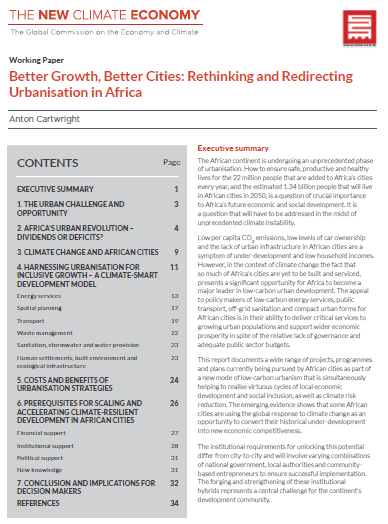Better Growth, Better Cities: Rethinking and Redirecting Urbanisation in Africa


The African continent is undergoing an unprecedented phase of urbanisation. Twenty two million people are added to Africa’s cities every year. The estimated 1.34 billion people that will live in African cities in 2050 in the midst of unprecedented climate instability poses a critical challenge to Africa’s future economic and social development.
The African continent is undergoing an unprecedented phase of urbanisation. Twenty two million people are added to Africa’s cities every year. The estimated 1.34 billion people that will live in African cities in 2050 in the midst of unprecedented climate instability poses a critical challenge to Africa’s future economic and social development.
The fact that so much of Africa’s cities are yet to be built and serviced, presents a significant opportunity for Africa to become a major leader in low-carbon urban development. The appeal to policy makers of low-carbon energy services, public transport, off-grid sanitation and compact urban forms for African cities is in their ability to deliver critical services to growing urban populations and support wider economic prosperity in spite of the relative lack of governance and adequate public sector budgets.
This report documents a wide range of projects, programmes and plans currently being pursued by African cities as part of a new mode of low-carbon urbanism that is simultaneously helping to realise virtuous cycles of local economic development and social inclusion, as well as climate risk reduction.